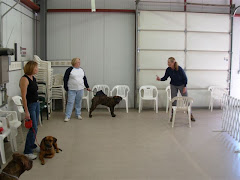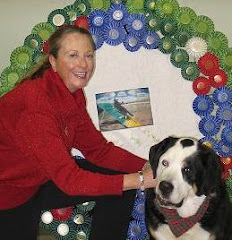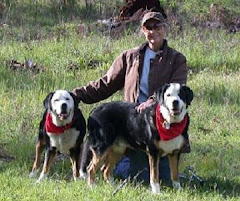
Boxers are honest dogs.
If they had sleeves, they'd wear their emotions and thoughts on them. There's no pretense with a Boxer. They're real, they're forthright. They connect with people and dialogue quite well without words.
In 19 years I've probably worked with at least 200, and liked the vast majority of them. I liked their intelligence, their intensity, their dignified loyalty to their own people, and their exuberance when they made friends with other people or dogs. I even like the funky breathing/wheezing sounds they make.
Of all those Boxers, I can only recall a handful who were aggressive. While there's a tendency for some dog aggression, I rarely saw people-aggressive Boxers. Those few were unbalanced dogs. Most of the dog aggression I've witnessed has been due to the Boxer's method of play. It's rough and strong, and a bit overwhelming for many dogs who will retaliate with growls. The Boxer, in turn, might growl back, and then you have a potential problem. For this reason, most Boxers prefer to play with other Boxers or dogs whose strength and agility match their own. Maybe that's part of the reason why most people I know with Boxers have two of them.
This is a dog with tremendous energy and strength, and his needs for exercise are great. He's an athlete who needs an outlet, although it needs to be a safe outlet. This is a solid-bodied dog on long, spindly legs, so he's prone to cruceate ligament tears. It's prudent to monitor or disallow really rough play (which they love) and take great care to guard against injuries in sports like agility.
One of the most effective trainers I've ever known is Linda Clark of Yakima. She's owned Boxers for years, and has run the gamut in training styles (which come and go like the weather). She's good at individualizing her training program to fit the personality of each dog, and her Boxers are phenomenally well behaved. Control is a big issue for Linda, and it's important when you're working with such massive and exuberant dogs. She'd probably be the first to admit that a Boxer is a training challenge. The biggest problem for most folks is finding adequate time to work with them when they're young. Training-wise, this is a high-maintenance dog for the first couple years. You won't get the dog of your dreams by working with him for 20 minutes a week. The young Boxer's going to require at least half an hour a day of concentrated work, supplemented with short practical exercises and consistent handling the other 23 1/2 hours. I'd bet Linda Clark puts in at least that much time on her dogs, and it shows. They're nice to be around, and oh so bonded to her and her husband Bill.
The AKC standard for Boxers is a minimum of 21 1/2 inches at the withers for females and a maximum of about 25 inches for males. Boxers who are significantly shorter or larger than this are still just "Boxers." There are no miniatures, standards or giants. Colorwise, they should be fawn or brindle, and can't have white over more than one third of their body. White Boxers are undesirable to breeders, and should not be bred. Spayed or neutered, they make great pets, but they do have a higher tendency toward deafness (about 18% of white Boxers are deaf, according to one breed rescue group).
With their short hair, Boxers are low maintenance in the grooming department. I've known several with sensitive stomachs, however, and their deep chests make them candidates for bloat, a potentially deadly condition. They tend to put on weight rather easily, so they should be kept on a pretty regimented diet. Any extra weight on such an already massive dog will be hard on a Boxer's joints.
This is a thinking dog. A Boxer will love and flourish in obedience competition, where he must make choices and solve puzzles (like scent discrimination and other utility-level exercises). He has a high will to please, which makes him a pleasure to work with. He's also emotionally sensitive, and responds best to clear, succinct commands and signals with well-timed praise.
A Boxer will need a coat in the winter, and will have difficulty handling extreme heat in the summer. So baby him. That's one of the fun things about having a Boxer. They're appreciative of what you do for them.
If you have patience, energy, lots of time to spend with your dog, and a desire for a dog who will return everything you give to him with interest, get a Boxer and you'll have a wonderful friend for many years. On second thought, you'd better get two and double your fun.


















1 comment:
A small family (2 + occasional puppies) of boxers live behind us. Our dog, Bergere' gets so excited when we're out and we see boxers. Its like you can see her thinking. . .hey- I might know those dogs, can we go say hello?
The first time we noticed it was watching a dog show on the Animal Channel a few years ago.
Post a Comment